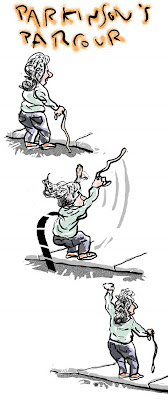It's all I can do to restrain myself from from typing the following news in all capital letters, followed by multiple exclamation points. Why am I so jazzed? Because it looks like we are getting very close to what I thought was an impossible dream. We hope to bring up a Parkinson's Disease specialist to see patients here in Anchorage on a quarterly basis.
His name is Dr. Alec Glass. Dr.Glass works as a Parkinson's specialist at University of California San Francisco, I will post a look at his training at the bottom of this update.
How close are we?
Here is an excerpt from an email he recently sent.
"I have submitted my application for an AK license which should be processed in early 2009—hopefully!... I am excited to kick this off and hope that we can improve PD care for patients up there."
This is a terrific opportunity for Alaskans to see a first-rate, well-trained and personable neurologist without the hassle and expense of traveling thousands of miles to find expert care. Which brings up the following concern: Dr. Glass will need enough patients to make this worth the effort and cost. This is where you come in. How do you make an appointment? Dr. Frank Ellenson is the local neurologist who will be hosting Dr. Glass. So, any of you who could benefit from this please arrange a visit through Dr. Ellenson's office. You will likely need a referral from your current provider.
A big thank-you to all involved in getting us to this point. I especially need to single out our visiting support group member Joanne Power, who got this ball rolling.
In conclusion,just let me add WOOOOO-HOOOOOOOO!!!!!!!!!!
Here is the contact info:
Alaska Neurology Center. 3851 Piper Street Suite T345. Anchorage AK 99508. 1-866-977-2562 Phone/Fax.
Alaska Neurology Center can be contacted through their web site.
Here is more information on Dr. Glass.
Current Position
September 2006- present Assistant Clinical Professor of Neurology
Education
1993-1997 Trinity University, San Antonio B.A. Cum Laude,Psychology
1997-2001 University of Texas, San Antonio M.D.
2001-2002 Tufts-SEMC, Boston Intern Internal Medicine
2002-2005 Tufts-NEMC, Boston Resident Neurology
2005-2006 Mayo Clinic, Rochester Fellow Movement Disorders
Certification & Licensure
2005. Medical Licensure, Minnesota
2006. Medical Licensure, California
2007. ABPN Board Certification, Neurology
Honors and Awards
2004 AAN travel award for outstanding resident teacher.
1997 Cum Laude with Departmental Honors
Scientific Society Roles and Memberships
Memberships:
2001-present American Medical Association
2001-present American Academy of Neurology
2005-present International Movement Disorders Society
2007-present American Academy of Sleep Medicine
Service to Professional Organizations:
2005-present Member, Ethics committee, American Academy of Neurology
Keywords/Areas of Interest:
Parkinson’s Disease, Movement Disorders, Dystonia, Botulinum Toxin, Tremor, Deep Brain Stimulation, Electrophysiology of Movement Disorders
Professional Activities
Clinical Care, Movement Disorders: I see patients with various movement disorders including Parkinson’s disease, dystonia, myoclonus, tremor and more unusual movement disorders 4 half-days per week. . Additionally I spend 3 half days per month in the Botulinum Toxin lab in which Botulinum therapy is administered for dystonia, spasticity, and sialorrhea. One day per week is spent seeing patients with various sleep disorders in the UCSF Sleep Disorders Clinic at Mount Zion. One day per month is spent in the clinical Movement Disorders electrophysiology laboratory in which surface and needle EMG are used in conjunction with various other modalities in the evaluation of various complex movement disorders (myoclunus, non-routine tremors) Finally, I assist in the care of patients treated surgically for Parkinson’s disease, dystonia and tremor.







































